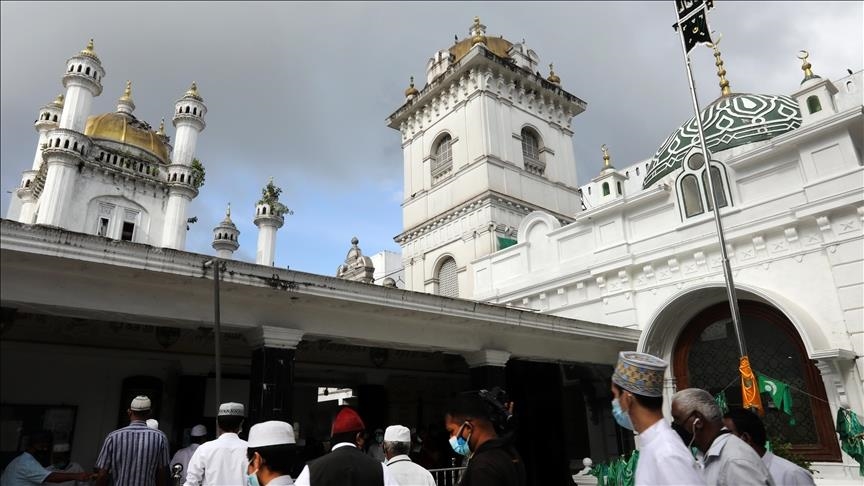Forming all-party government, new election topmost need in Sri Lanka, say experts
Many challenges ahead for new President Ranil Wickremesinghe, say analysts

NEW DELHI
Restoration of democracy and forming an all-party government is the need of the hour in crisis-hit Sri Lanka, according to political commentators and experts.
Last month, Ranil Wickremesinghe was sworn in as the new president of the country, which is grappling with its worst financial crisis.
Crippled by a shortage of foreign exchange reserves after the collapse of its tourism-dependent economy, the country of 22 million people has defaulted on all of its foreign debt. It has been unable to pay for food, fuel, and other essentials, with a fuel shortage leading to prolonged daily power cuts.
Gotabaya Rajapaksa resigned as president last month after fleeing to the Maldives and then Singapore when anti-government protesters took to the streets of Colombo and occupied his official residence and offices. His brother, Mahinda Rajapaksa, stepped down as prime minister amid mass protests in May.
Experts say the island nation has to take a number of steps to come out of the multifold crisis as protests have surpassed 100 days.
The protesters are demanding a new constitution, fair elections within a year, and a reduction of executive powers of the president.
Challenges ahead
Noted Sri Lanka political commentator Jayadeva Uyangoda told Anadolu Agency by email that Wickremesinghe has two immediate priorities and challenges.
The first is forming an all-party government "without an overbearing presence" of the Rajapaksa's SLPP (Sri Lanka Podujana Peramuna) and by doing so "dispel the opposition's mistrust that he is representing and protecting Rajapaksa interests," he said. "That is a precondition for restoring some measure of credibility and legitimacy for his leadership as President."
He said the second step is working out a policy framework to be presented to the International Monetary Fund (IMF), the World Bank, and international creditors that will not pass the burden of economic recovery on to the poor and the middle classes.
Saying that Sri Lanka is facing a triple crisis -- economic, political, and social, he added that the public does not believe that the new president and Prime Minister Dinesh Gunawardena have much credibility.
Sri Lanka follows a semi-presidential system, with a mixture of a presidential system and a parliamentary system. The president of Sri Lanka is the head of state. The prime minister, who is his deputy, leads the ruling party in parliament, besides sharing many executive responsibilities.
"What they should do is to lay the foundation for a democratic government and begin a process of new approach to solve the problems within an inclusive, democratic and people-friendly framework," he said.
He listed the future actions needed in the country. "There should be the restoration of democracy; setting up of a transparent and accountable system of economic governance; implementation of a social support program for the poor and the low-income families; restoring the public trust and legitimacy of the government and the political class," he said.
Uyangoda stressed the need to follow a foreign policy that does not allow "global and regional powers to dictate terms on the government and the people, or to hijack the people's uncertain future amidst the seemingly unresolvable crisis."
Facing resistance
Ramesh Ramasamy, a faculty member at the Department of Political Science, University of Peradeniya, Sri Lanka told Anadolu Agency by email that the new president and his government are facing resistance among people.
The government clearly does not have public support and the president fully relies on the support of Rajapaksa's party for survival, he added.
"So he is obliged to show the public that he is independent (...) He should prove it through his actions to win the trust of the people, if so people will give him a chance to revive the economy and bring back political stability," he said.
Wickremesinghe last month said he is a "friend of people" and "not a friend" of the Rajapaksa clan.
Among the new president's mistakes, he said, are failing to hold talks with the protesters and using the military to crush the non-violent protests shortly after taking charge.
He said that the only way out is a fresh election which will give a fresh mandate to a political party to govern the country. "This has been the demand of the public, protesters, and opposition political parties. Only through the new election, the current turbulence can be addressed and people will start to trust the new government," he said.
Thyagi Ruwanpathirana, an Amnesty International researcher based in Colombo, echoes the view on the president's lack of popular support.
"He also doesn’t seem to have the opposition’s support. How he will manage to implement unpopular austerity measures and provide the assurance of policy stability required by the IMF without an all-party government is anyone's guess," she told Anadolu Agency.
She said many see the new president as a "proxy" of Rajapaksas.
According to Ruwanpathirana, the current parliament does not reflect the mandate of the people, so elections are inevitable.
"Parliament needs to make a call and go for early elections, ideally in the next 3-4 months .. .the debt restructuring negotiations have to be expedited and an interim budget needs to be prepared in line with the concerns flagged by IFIs (international financial institution) while keeping the most vulnerable groups at the center of all negotiations," she said.
Anadolu Agency website contains only a portion of the news stories offered to subscribers in the AA News Broadcasting System (HAS), and in summarized form. Please contact us for subscription options.







